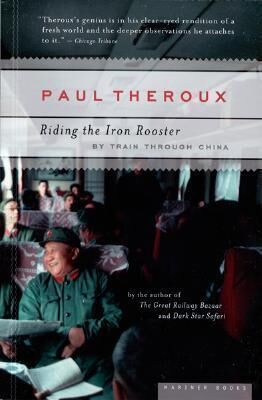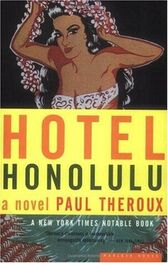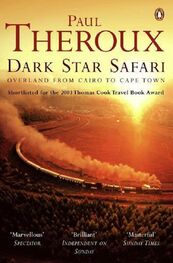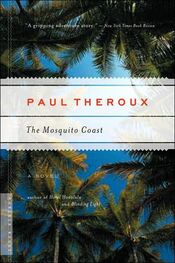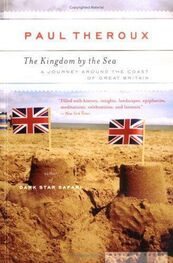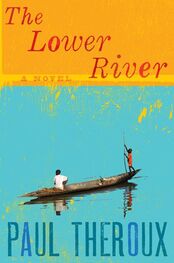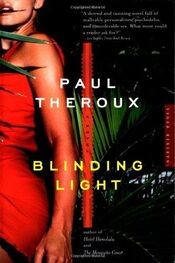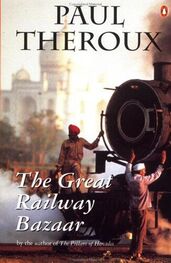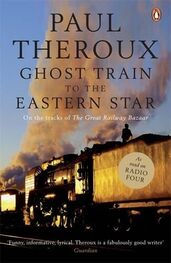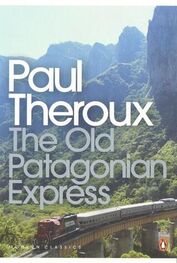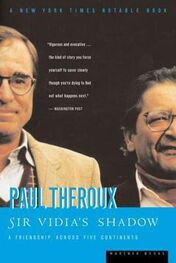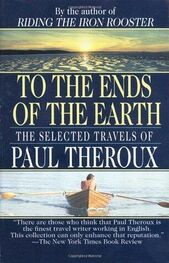"Do you have rooms?" I asked. I held out a picture of the Dalai Lama.
He mumbled a reply. His shaven head and big jaw made him look apelike. I switched to Chinese, because I couldn't understand what he was saying. He took the picture gently.
"One person — six yuan," he said, clutching the portrait.
"Oh, thank you, thank you," Mr. Fu said, abasing himself.
"Tea, tea," the cannibal said, offering me a tin kettle.
I drank some salty, buttery tea, and as I did, a truck pulled up outside. Twelve Tibetans, women and children, entered the room, went into the corridor, threw quilts on the floor and fell on them.
I paid my money, got my bag from the car and found an empty room on the second floor. The light on the stairwell had shown me what sort of a place it was. Someone had vomited on the landing. The vomit was frozen. There was worse farther on, against the wall. It was all icy, and so the smell wasn't bad. It was very dirty, a bare cement interior that was grimmer than any prison I had ever seen. But the real prison touch was that all the lights were on — not many of them, but all bare bulbs. There were no light switches. There were howls and murmurs from the other rooms. There was no water, and no bathroom. No toilet except the stairwell.
Not far away I heard Miss Sun berating Mr. Fu in an exasperated and whining sick-person's voice. I closed the door. There was no lock. I jammed an iron bed against it. There were three iron bedsteads in the room, and some reeking quilts.
I realized that I was shivering. I was cold, but I was also hungry. I ate half a jar of Ma Ling orange segments, and a banana, and I made tea from the hot water in the jug I had brought. I was light-headed and somewhat breathless from the altitude, and also nauseated from the frosty vomit in the corridors. Just as I finished eating all the lights went out: midnight.
I put on my gloves, my hat, my extra sweater, my coat, my third pair of socks and thermal-lined shoes; and went to bed. I had been cold in my life, but I had never worn a hat with earmuffs to bed before. I had a quilt over me and a quilt under me. Even so, I could not get warm. I could not understand why. My heart palpitated. My toes were numb. I tried to imagine what it must be like to be Chris Bonington. After a while I could see moonlight behind the thick frost on the window.
In the middle of the night I got up to piss. I used an enamel basin that I guessed was a chamber pot. In the morning the piss was frozen solid. So were the rest of my orange segments. So were my quails' eggs. Everything that I had that could freeze had frozen.
I had hardly slept, but I was gladdened by the sunlight. I found some peanuts and ate them. I ate my frozen banana. I visited the cannibal (he looked even dirtier in daylight) and drank some of my own tea with him. He did not want Chinese tea. He made a face as if to say, Disgusting stuff! How can you drink it?
The frail warmth of the morning sun only made the place worse by wakening the stinks on the stairs and in the corridors. There were dark clumps and little twists of human shit throughout the building. In this heavenly country, this toilet.
Mr. Fu was up and fussing. He said Miss Sun was not at all well. And he felt sick, too.
"Then let's go," I said.
"Breakfast first."
"Oh, God!"
But he insisted.
There was a dead dog lying at the entrance to the smoky hut where Mr. Fu and Miss Sun had their breakfast: eggs stir-fried in yak fat. Other dogs cowered and barked. An old dead sheep was flattened on the road, as stiff and worn as a hearth rug. Across a frozen pond was the army camp. A few scattered buildings stood in the rubble of the settlement. Tibetans with crimson headdresses watched me walk down the path. I kept walking until the dogs started barking, and then I headed back to the main road. It was full of dead animals that had been turned into flat, stiff corpses — gruesome little mats in the road.
Another late start. But this time I did calculations on my map, estimated the distances between towns, figured an average speed, and felt much better until I remembered the tire.
"Did you get the spare tire fixed, Mr. Fu?"
He had said that he would do it this morning, before breakfast. Although Amdo was a dump, there were garages here; and it was the only place of any size for miles.
"No. Better to get the tire fixed in Nagqu."
That was over a hundred miles away.
Mr. Fu took the wheel. A few miles down the road he stopped the car and clawed at his face.
"I cannot do it!" he shrieked. In Chinese it sounded like a pitiful surrender.
It was another attack of the wobblies. I welcomed it; I soothed Mr. Fu as he crept into the backseat. I slotted Brahms into the cassette player and drove south, under sunny skies.
I was feeling wonky myself. I had a bump on my head, a neck ache, and a deep cut on my face from the car crash. My right wrist hurt, probably a sprain, from my holding on during our careering. And the altitude affected me, too — I felt light-headed and nauseated, and my short walk in Amdo had given me heart palpitations. But this was nothing compared to Mr. Fu's agony. The color had drained from his face, his mouth gaped, and after a while he simply swooned. Miss Sun also went to sleep. Crumpled together on the seat, they looked like poisoned lovers in a suicide pact.
There were no more settlements until Nagqu, nothing except the windswept tableland, and it was so cold that even the drongs, the wild yaks, were squinting and the herds of wild asses did nothing but raise their heads and stare at the badly damaged Mitsubishi Galant. After a few hours the road ran out and was no more than loose rocks and boulders, and more wild asses. The boulders clunked against the chassis and hammered the tires. We had no spare tire. We were ridiculously unprepared for Tibet, but I did not mind very much. I felt, having survived that crash, that we had come through the worst of it. There is something about the very fact of survival that produces a greater vitality. And I knew I was much safer as long as I was driving. Mr. Fu was not really very good at all, and as a nervous new driver, he had no business to be in Tibet.
On some hillsides there were huts flying colored prayer flags. I was cheered by them, by the whiteness of whitewashed huts, by the smoke coming out of the chimneys, and by the clothes that people wore — fox-fur hats, silver buckles, sheepskin coats, big warm boots. Miles from anywhere I saw a mother and daughter in bright, blowing skirts and bonnets climbing a cliff side path, and a handsome herdsman sitting among his yaks, wearing a wonderful red hat with huge earflaps.
Mr. Fu was very annoyed that there was nowhere to eat at Nagqu. He was stiff and cranky from the altitude, and reluctant to stay, but I pestered him into finding someone to fix the spare. This was done in a shed, with fires and chisels; and while this primitive vulcanizing went on, I walked around the town. John Avedon's In Exile From the Land of Snows (1984), which is mainly an anti-Chinese account of the recent turmoil in Tibet, and pleasantly passionate on the subject of the Dalai Lama, claims that Nagqu is the center of the Chinese nuclear industry. The gaseous diffusion plants, the warhead assembly plants and the research labs have been moved here from the Lop Nor Desert. Somewhere in this vicinity — though you'd never know it from looking at it — there was a large repository of medium-range and intermediate-range nuclear missiles. But all I saw were yaks.
Snow came down like soap flakes, big damp things. It was only minus ten centigrade, but in the high wind and blowing snow it felt colder. I took shelter in a Chinese store and ate my jar of Golden Star pickled quails' eggs. I noted that a Tibetan woman was buying an orange plastic bag, and a middle-aged Tibetan man was trying out a blond doll. A metal key stuck out from between her buttocks, like an enema nozzle; he wound her up and her legs and arms moved. The man laughed and bought the thing.
Читать дальше